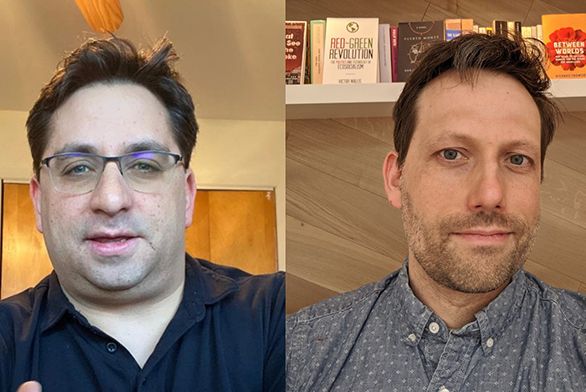Alumni-Founded Publishing Company Expands the Great Conversation
July 16, 2020 | By Anne Kniggendorf

Lewis Slawsky (A03) and Alex Wall (A03) met across the freshman seminar table. The two bonded over Aristotle’s Politics both in and out of class—so much so that about a decade after graduation, they took their publishing company’s name from the book: Political Animal Press. “It’s from Aristotle’s claim that human beings are by nature political animals,” says Slawsky, who lives near Chicago.
In the years before they founded the press, Wall and Slawsky each studied political science in graduate school; Wall was at Harvard University, while Slawsky ended up in Israel, where he also researched Middle Eastern Studies. Several years into the world of specialized study, neither felt comfortable with the narrow siloes they saw academics shoving ideas into. It wasn’t the way they’d learned at St. John’s College.
“I loved St. John’s,” Wall says from his home in Toronto. “I thought that the way in which we approached matters—where we read philosophy and literature side by side and worked our way up through the history of the canon and through the development of thought—was just outstanding.”
Following their experiences in academia, the pair says, they shared a suspicion that when intelligent people want to learn something new, academic writing often isn’t conducive to the process.
“[Academics] write in specialized jargon, or they don’t draw out connections between the specific thing they’re studying and general human interest or concern, for fear of going beyond their area of expertise,” Slawsky says. “But human beings want to think about things and understand things—and understand them in general and natural ways.”
To counter that problem, they started Political Animal Magazine, an online journal, in 2015. They set out to include written work on “politics” the way they understood the field after studying at St. John’s—that is, politics as nearly anything that concerns human beings coming together, including arts and literature, matters of law and justice, and even business and commerce.
Slawsky says they were trying to create a space for the “belief that one can think more deeply and in a more considered manner about things like politics, which are very important and need to be rescued from sort of puerile partisanship and momentary concerns.”
After the online magazine met with some success, they began a press by the same name: Political Animal Press for nonfiction, and an imprint called Crowsnest Books for fiction. Political Animal Press is a spin-off of Wall’s parents’ press, Wall & Emerson Inc., which he now runs. (Wall & Emerson published the Drake translation of Galileo’s Two New Sciences used at St. John’s.)
Political Animal Press published its first title in 2017, and the duo has since published five more works, with at least three more due to come out in the fall: Branding Germany: How a Cultural Identity was Created, Packaged, and Sold in the United States by Wilson Dunlavey (A03); Santa Fe tutor Claudia Hauer’s Strategic Humanism: Lessons on Leadership from the Ancient Greeks; and the late tutor Lise van Boxel’s Warspeak: Nietzsche’s Victory over Nihilism—originally planned for a spring release, but delayed by the spread of COVID-19.
Wall says the press and the magazine are his way of continuing the important conversations started at St. John’s. He says one of their titles, Unhappy Silences by Berenice Malka Fisher, gets at what he calls the “eternal question” of action versus contemplation. Another, Between Worlds by Richard Frontjes, explores reason versus revelation. For Wall, it’s all about expanding the type of dialogue too often confined to “academia.”
“I thought that one way to [carry] this conversation forward into the modern era would be to redirect the publishing business toward the sort of books that really try to engage with the broader, bigger picture sort of questions,” he says.
An intellectual conversation defined by dialogue and foundational questioning; a refusal to accept the status quo. In other words, an unquestionably Johnnie way of doing business.
Slawsky and Wall say they welcome magazine submissions by Johnnies.

